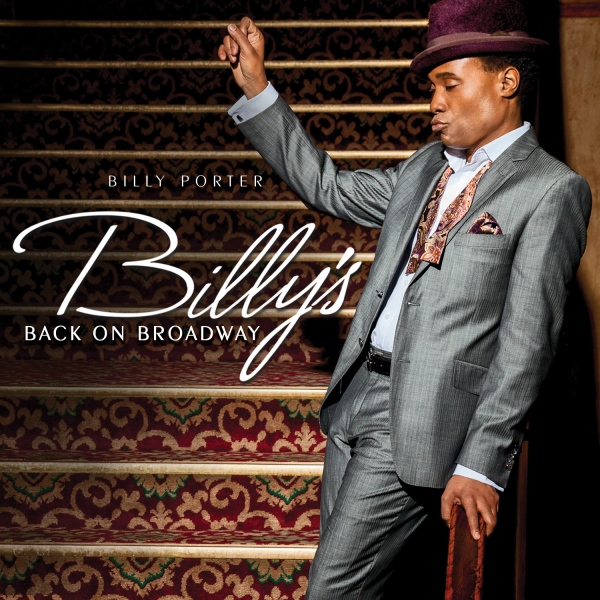Billy Porter: Billy's Back on Broadway
The Tony Award winner from Broadway’s ”Kinky Boots” releases a new album of Broadway favorites spun in his own unique style.

The back cover of Billy Porter's latest album, Billy’s Back on Broadway, features the performer relaxing in his dressing room at the Al Hirschfeld Theatre, where he currently appears as Lola, the role he originated in the Broadway musical Kinky Boots. A Tony Award casually rests on a high shelf. Porter kicks up his feet on the makeup table, knocking back what appears to be a scotch served neat. It's an appropriate drink choice for a performer whose voice has matured greatly since his breakthrough role as a gospel-infused "Teen Angel" in the 1994 Broadway revival of Grease. If Porter's "Beauty School Dropout" was the musical equivalent of slamming a Vodka Red Bull, Billy's Back on Broadway is more like nursing a double Johnnie Walker Blue Label.
"When I was younger I did what I now call 'extreme singing.' I could do this thing where I would sing really high. I can't really do that anymore, at my age," Porter recently told Peter Cooke in an extended interview at his alma mater, Carnegie Mellon University. "My voice has shifted. It's changed." A lower register (with a distinctive rasp that was always there, but is now significantly accentuated) is what gives Porter's voice a tangy kick of personality. But Billy's Back on Broadway is not so much driven by vocal pyrotechnics as it is by unique interpretation.
He opens with a fairly standard rendition of Kander & Ebb's "And the World Goes 'Round" from New York, New York. This leads into an arrangement of "Everything's Coming Up Roses" that wouldn't feel out of place at the midtown jazz club Birdland. It has none of the mania of the original in Gypsy, but exudes a peppy optimism. It feels like music to gussy up to before receiving guests for a cocktail party. He chases that with "Don't Rain on My Parade," which introduces a controlled and driving groove to the orchestral accompaniment of the first two tracks. Liza and Ethel and Barbra, oh my! Is Billy Porter trying to tell us that he's the next great diva of Broadway?
The following track, Lerner & Loewe's On the Street Where You Live, is pleasant and mellow, if not particularly memorable. He holds out the final, ghostly vowel for what feels like infinity before launching into the Walter Marks anthem of self-affirmation, "I've Gotta Be Me'' (made popular by Sammy Davis Jr.). This number, like "Everything's Coming Up Roses," has an assertive drive that is less bombastic than older versions. It also represents a stylistic shift in the album as the music becomes more contemporary.
Cyndi Lauper's "I'm Not My Father's Son" is the only song on the album from Kinky Boots. An R&B beat persists throughout the song in a manner reminiscent of the pop cover of a Disney ballad. Porter sings a duet with Lauper on the next track: a mash-up of "Happy Days Are Here Again" and "Get Happy." Their pairing is surprisingly chill considering the manic tone of the originals: "Happy Days" was used as the theme for FDR’s 1932 election and "Get Happy" was sung with energetic gusto by Judy Garland for the 1950 MGM film Summer Stock. In contrast, this duet has the air of a lazy Sunday afternoon.
Frank Loesser's "Luck Be a Lady" opens with an extended organ solo, appropriate for this special arrangement that blends soul and funk. Backup singers repeat "Be a Laday, Be a Laadaaay" on the beat as Porter intones a rifferiffic interpretation of the verses. Guys and Dolls has never sounded so sexy.
Porter wraps it up with a shockingly restrained version of "I Am Changing" from the Henry Krieger and Tom Eyen musical Dreamgirls. It feels like a tour de force performed in a nearly empty bar at 3am. Porter sings to a few half-asleep barflies while the staff mops up, and this just encourages him to give the song his all. It's beautiful in its hopefulness, with the percussion pulling Porter back to earth several times before he finally breaks through in the final moments and soars.
Producer Rob Mounsey has put together an extraordinarily rich album. The big-band sound of the first three tracks seamlessly cedes to a more modern, R&B feel. Lush strings carry us through this time warp. You can sense the album tempting you down the rabbit hole to increasingly unconventional arrangements of classic songs. A gentle Hammond organ undergirds several of the later tracks, subtly suggesting the gospel sound that was much more explicit in Porter's last album, At the Corner of Broadway & Soul, recorded nearly a decade ago.
While Billy's Back on Broadway never reaches the dizzying frenzy that one would expect from a Broadway album, that turns out to be a very welcome thing: This mature album grooves along at an easy pace, perfect for an intimate dinner or as underscoring for hours of red wine-soaked chatter.







